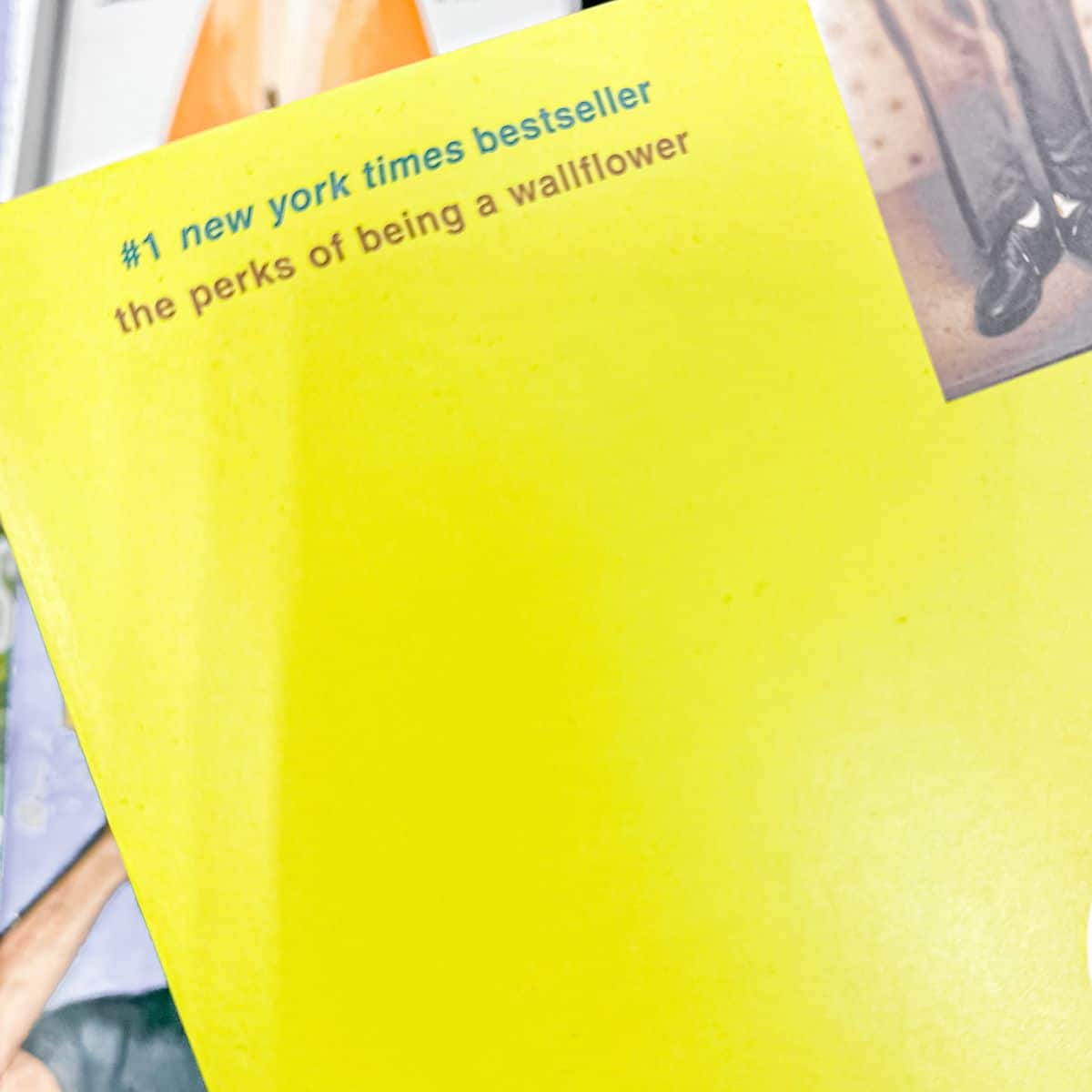This The Perks of Being a Wallflower summary breaks down Stephen Chbosky’s bestselling literary fiction book. This book is one of my all-time favorites, and I’ve laid it all out in detail for you. All your lingering questions will be answered, so let’s get literary!

The Perks of Being a Wallflower Summary and Analysis: With Spoilers
This free book summary covers both the book and the movie intertwined. I read and watched it the same day and loved them both. While there are some differences, the book and movie are generally the same, and I can’t differentiate them completely.

Quick Overview
The Perks of Being a Wallflower is a 1999 coming-of-age epistolary novel by Stephen Chbosky. It follows Charlie, a high school freshman, navigating friendships, family dynamics, mental health challenges, and self-discovery.
It has sold over five million copies despite being an often banned book. It takes place in 1991 and 1992 in Pittsburgh, Pennsylvania. The 2012 film adaptation was directed by author Stephen Chbosky and starred Emma Watson.
I decided to read The Perks of Being a Wallflower as part of my Rory Gilmore Reading Challenge to read the books mentioned in the Gilmore Girls.
It’s the most intimate and purposeful character-driven story set in school. This book is so richly layered with symbolism and themes about overcoming trauma and maintaining hope. (It totally gave me a book hangover!)
This is one book I could read again and find something newly meaningful each time.
Main Characters
- Charlie: the introspective protagonist, a high school freshman dealing with mental health issues and the recent suicide of his best friend
- Sam: a senior and one of Charlie’s kindest and best friends whom he has a crush on
- Patrick: Sam’s extroverted and openly gay stepbrother, who is also one of Charlie’s closest friends
- Candace: Charlie’s older sister, a senior dealing with an abusive boyfriend
- Aunt Helen: Charlie’s beloved aunt whose death deeply impacted him
- Brad: a popular football player secretly dating Patrick
Full Synopsis
Charlie is an introvert entering his first day as a freshman in high school in Pittsburgh in 1991. His friend committed suicide at the end of the prior school year.
Charlie faces this challenge by writing the first of a series of letters to an unnamed “friend,” who he notes seems trustworthy and not judgmental of things like the “hospital” at which he spent time.
Note: The “friend” and the “hospital” continue to be referenced throughout The Perks of Being a Wallflower, but their significance is not revealed until the end.
At the outset, Charlie is a passive observer of life, watching life occur all around him and keeping everyone’s secrets but not truly participating. He sees sadness everywhere. His siblings aren’t that nice to him, and, at times, he feels invisible. For example, he witnessed a date rape at a young age.
Charlie’s brother (who is never named) is a new college student playing football at Penn State. His stepsister, Candace, is an extroverted senior at Charlie’s high school, immersed in a relationship with an abusive boyfriend, Derek. Charlie also lives with both his parents, who come from troubled pasts. While not “bad” parents, they do seem detached.
Charlie is naturally an advanced English student who loves literature and reads and references books throughout the novel. On his first day of school, the only friend he makes is his English teacher.
Get the full list of books mentioned in The Perks of Being a Wallflower.
His sister’s boyfriend makes mixed tapes for her, to which Charlie listens and, like literature, this form of art becomes therapeutic for him.
Charlie eventually befriends a quirky senior from his shop class named Patrick, and Patrick’s sister, Sam. Patrick likes Charlie because he is the only person who doesn’t refer to him by an unfortunate nickname: “Nothing.” Charlie sees Patrick as a person.
After the football game, they all hang out at Big Boy and talk about music. Again, culture is important to Charlie’s social development and personal growth.
At the Homecoming dance, Charlie watches Patrick and Sam exuberantly dance like no one is watching, and he eventually joins them. It’s a moment of pure joy.
Then, at a party, Charlie meets another friend, Mary Elizabeth, who he describes as a “Buddhist punk.” He opens up very comically when he gets “stoned.” At this time in Charlie’s life, only the influence of drugs can help Charlie be himself.
Charlie also witnesses Patrick kissing a football player named Brad and promises not to tell. Patrick toasts Charlie because:
“he sees things, and he understands.”
Again, Charlie is an observer and a confidant. Charlie remarks he didn’t think anyone had noticed him. At this moment, Charlie has officially made friends who accept him for being himself.
Charlie, Patrick, and Sam drive together through a tunnel in a convertible, and Sam stands with her arms outstretched, feeling the wind blowing against her and the sound of music flowing through her ears.
Charlie just watches her but later begins listening to Sam’s favorite music. He makes mixed tapes for her because he deems this a socially proper act of love — something he has learned from watching his sister’s relationship. Charlie wants to experience love but does not yet know how to do so in his own way.
Charlie begins to enjoy high school with his new friends. He learns more of their secrets, including that Patrick has a secret affair with Brad and that upperclassmen used to get Sam drunk at parties.
Charlie then attends his friends’ theater re-creation of The Rocky Horror Picture Show. They’re another cast of misfits looking for acceptance.
At a party, Charlie offers to help Sam study for the SATs. This is another way Charlie attempts to show love without knowing how. He believes that making Sam happy is love and that he need not seek anything in return.
Ironically, this sentiment can also apply to Charlie and many other characters. It’s a major theme of The Perks of Being a Wallflower.
As Christmas approaches, Charlie participates in Sam’s Secret Santa. He receives a suit from Patrick that will make him look like a great writer. This implies that Patrick is a true friend who believes in Charlie’s talents.
Sam surprisingly gives Charlie a typewriter as a gift, and she tells Charlie to write about them — his friends. This is another sign that Charlie has met people who accept him and believe in him.
This act of giving inspires Charlie to let his guard down and admit he’s never had a girlfriend, nor has he been kissed. Sam admits her first kiss was a grown man and that she used to sleep with people who treated her poorly.
As much as Charlie looks up to Sam, we will further learn how similar Sam’s and Charlie’s backgrounds and needs are and why Charlie feels so connected to her. Charlie tells Sam that this happened to his Aunt Helen, too, and that she turned her life around.
At various times in The Perks of Being a Wallflower, Charlie describes his Aunt Helen as his best friend and someone who truly loved him. He feels responsible for her tragic death in a car accident because she was buying him a present at the time. She always bought him two gifts for his Christmas birthday, and he experienced this as love as a child.
(This is explored in greater detail in the book than in the movie.)
Although Sam likes Craig, she tells Charlie she wants to make sure the first person who kisses him loves him, so she kisses him.
Charlie’s brother returns home, and they celebrate Christmas and Charlie’s birthday. His brother encourages him to talk to his friends if he needs help, and he confesses that he would like to ask Sam out in a few years “when the time is right.”
Charlie’s brother is growing up by treating him kindly. The theme of getting through life with the support of family, not just friends, is also present in The Perks of Being a Wallflower.
Charlie rings the New Year in with his friends, having gained his friends’ protection and “safety net” to make efforts to experience life. Then, he thinks about his beloved Aunt Helen and the secret she asked him to keep before her tragic death. He is found passed out on the snowy ground.
While Charlie has been making social progress, it’s clear something is still holding him back.
Next, instead of watching his friends re-enact The Rocky Horror Picture Show, Charlie is asked to step in and participate. He’s secretly thrilled to be acting provocatively with Sam as his lead. He asks to join the cast as an alternate. Through acting, he can practice living in a safe way.
In the book, Charlie also acts as the confidant and helper of his sister, Candace, as she has an abortion. Throughout the story, as Charlie grows, so too does his relationship with Candace. He experiences the healing bonds of family first by healing his sister.
Mary Elizabeth asks Charlie to the Sadie Hawkins Dance and so, Charlie attends his first official date. Afterward, Mary Elizabeth starts to get physical with Charlie, but he is very nervous. He very confusedly becomes Mary Elizabeth’s boyfriend. This is not because he wants to, but because he doesn’t want to hurt her feelings. Charlie is still somewhere between a passive and an active participant in life.
When Charlie is later dared to kiss the prettiest girl in the room, he kisses Sam. Patrick tells him it’s best if he stays away for a while due to the “history” between Sam and Mary Elizabeth.
This loss of friendship causes Charlie to regress to negative thoughts and feelings about something unclear but very ominous in his past.
Charlie hears that Brad’s father has learned about Brad’s relationship with Patrick, and Brad comes to school with a black eye. Later, Patrick and Brad get into a fight when Brad refers to Patrick as “Nothing” and another derogatory term, and Charlie steps in to support Patrick.
Through Brad, Charlie sees the consequences of someone not being accepted as they are. By stepping in, Charlie shows through physical actions, rather than quiet observations, that he cares for and accepts Patrick as he is.
Brad even secretly thanks Charlie for stepping in, and in this unexpected way, Charlie conveys acceptance towards Brad.
Regardless, Charlie blocks out the memory of the fight and can’t recall it, just as he has blocked out and can’t recall the other negative events in his past.
By helping Patrick, Charlie earns his way back into the gang. He and Patrick talk and wonder why they can’t save people from themselves. After this intimate moment of communication, Patrick kisses Charlie, and Charlie lets him, giving in again to someone else’s needs rather than his own to experience love.
Charlie’s sister and friends prepare for college as the school year progresses. Charlie’s English teacher tells him he can write a book someday, and again, Charlie experiences acceptance and encouragement.
As the seniors graduate, we learn that Craig has been cheating on Sam, and they broke up.
Ending Explained
Before Sam leaves for college, Charlie wants her to know that the night of the homecoming dance (when they drove together) meant something to him. So, he gives her his beloved books.
Sam wonders why her friends love people who treat them poorly, and Charlie reiterates that they accept the love they think they deserve. Sam asks Charlie why he never asked her out. At this moment, Charlie’s sentiment also applies to him.
Sam challenges Charlie to actually live and not just participate in life. She encourages him not to put everyone’s needs above his. She tells him she wants people to like the real her, but she cannot feel that if he doesn’t act out his feelings toward her.
So, Charlie finally decides to act on his feelings and kisses Sam passionately. It’s presumed they have sex.
Finally, in this very physical act, Charlie can recall the trauma of his past. His Aunt Helen molested him, and he feels responsible for it. Charlie has a breakdown and admits to Candace he actually wanted Aunt Helen to die. He spends the summer in the hospital, and his family learns what happened to him.
Back home in the fall, Charlie has dinner with his family. They seem to have also grown over the course of a year. He returns to Big Boy with Sam and Patrick.
Sam reveals that she found the song playing when they drove through the tunnel, and she asks Charlie and Patrick to go for a drive. This time, Charlie is fully present, and he experiences the song, the wind, and life as Sam had done one year earlier. He emerges from the cocoon of the tunnel as a butterfly.
Coming full circle, Charlie tells his “friend” to whom he writes letters that he may no longer have time to write because he’s too busy living. He’s not just a sad story on a piece of paper. He’s alive.
Note: To whom the letters are written is not revealed. One theory is that Charlie was writing them as part of therapy. Another theory is that the letters are directed to the reader.
In the book, the reader learns that Charlie’s letters not only changed his life but also went on to change and save the lives of other lost and traumatized teens over decades. It’s implied that Charlie’s letters became the basis of a book and that he achieved his full potential despite his trauma.
Charlie discusses his thoughts on generational trauma and how people respond differently. He doesn’t believe these different reactions make people inherently good or bad, which implies that he forgave his Aunt Helen over time.
Charlie also notes that everyone is dealing with something and that no one’s suffering is less than another’s. In this way, everyone has been “Charlie” at some time.
No one is alone. Participating in life is hard work, but it’s worth it, and it can help overcome trauma.
THE MEANING OF THE PERKS OF BEING A WALLFLOWER
While Charlie wasn’t able to save the life of his friend who had committed suicide when the novel began, by coming of age, he was able to save many others, including himself, who have all gone on to be thriving adults.
This was the perk of Charlie’s having been a wallflower.
About Author Stephen Chbosky
about
Stephen Chbosky is an American author, screenwriter, and director, best known for his 1999 novel The Perks of Being a Wallflower. He also wrote the screenplay and directed the 2012 film adaptation of the book.
Chbosky has worked on various film and television projects, including writing the screenplay for Beauty and the Beast (2017) and directing the film adaptation of Dear Evan Hansen (2021).
He was born in 1970 in Pittsburgh, Pennsylvania.
Final Thoughts
This The Perks of Being a Wallflower summary showcased a poignant coming-of-age story. Through Charlie’s eyes, we witnessed the complexities of trauma in adolescence and the transformative powers of acceptance and self-discovery.
This novel reminds us of the impact of our past experiences on our present selves. It also offers hope for healing.

remember, it’s a good day to read a book. – jules



